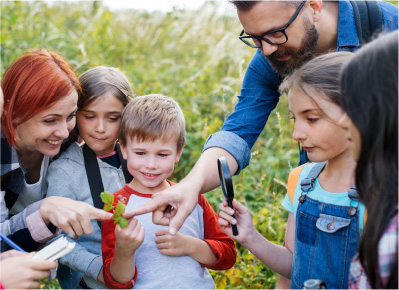Emotional Intelligence and Kids’ Behavior: What You Need to Know
Studies have shown that a child’s level of emotional intelligence is a significant predictor of delinquency. Children with higher emotional intelligence and self-awareness are less likely to exhibit delinquent behavior. While youths who live in disadvantaged areas are exposed to more risk factors that cause higher delinquency rates, troubled kids exist at every socioeconomic level. What can be done to improve emotional intelligence and develop happier, healthier children of all backgrounds? Read on to learn three modalities promoting kids’ healing and growth.
Unlocking Emotional Intelligence Using Arts Therapies
Expressive art forms are helpful to the healing trauma victims develop their emotional intelligence. Drawing is a form of nonverbal communication allowing one to release experiences and make meaning from them. Art calms the mind and improves mood, aiding in emotional self-regulation. It helps kids learn new skills and concepts, developing neural connections in the brain. When done in a group or with a therapist, art develops trust and allows children to appreciate people’s differences. Physically, art improves motor skills, hand-eye coordination, and muscle development.
The Morning Star Boys’ Ranch, one of Believe In Me: foundation for kids’ 2020 grant recipients, is aware of the creative arts’ cognitive benefits. Hands-on art projects like handcrafted volcanoes and rockets are incorporated into scheduled classroom time over summer to help retain the knowledge gained during the school year. These projects link science and art while sparking the imagination.
Parents can also help children reap art’s benefits by encouraging them to make art in a non-judgemental setting. They can talk with their children about what they chose to do and how they feel. Whether a child is struggling or not,incorporating the arts into their lives is essential for all aspects of their development.
You’ll Be Shocked at the Results of Letting Kids Play More
Play aids every child’s emotional intelligence and has been recognized as a right of every child by the United Nations High Commission for Human Rights. Play helps kids develop language skills, problem-solving abilities, creativity, and self-control. Several studies show that children pay more attention in school after they’ve had unstructured time for free play at recess. Playworks, another 2020 grant program recipient, recognizes obstacles to healthy play and gives schools tools to foster a productive environment for play during recess.
Playworks’ mission is important because several obstacles to play remain. Parents are told they must give their kids every opportunity to improve their futures, resulting in overscheduling. Changing family structures result in a lack of supervision, preventing play. However, parents can ameliorate these issues by prioritizing time for play at home using whatever materials are present, modeling play, and being open to a safe amount of risk. To support this, Playworks has provided free resources for cultivating play at home on their Facebook page. However, some kids cannot safely play due to the increased violence in disadvantaged areas or other environmental problems. The bigger issues of poverty, abuse, racism, and violence should be addressed on a larger scale before parents can be expected to optimize conditions for play or allow unsupervised play.
Here’s How I Found Out Nature Is the Best Medicine
To discover how outdoor immersion helps kids’ development, Believe In Me volunteer Kaylee Bosse accompanied Rick Severn of the Dishman Hills Conservancy on a walk through nature. Severn noted that hikers often focus on reaching a particular destination, whereas outdoor education promotes intentional wandering. Instead of focusing upward on the trees and sky’s expanse as most usually do, Severn urged Kaylee to examine some flowers scrupulously. . He handed Kaylee a small cardboard window colored black to block out everything surrounding the flowers to peer through and urged her to share observations.
Severn said he uses this focus tool with children to encourage them to ask questions and make their own meaning out of their observations. This honors and grows the child by allowing them to create their own learning experiences.
Kaylee was also prompted to listen to her surroundings with her body. She suddenly became more aware of the feeling of the wind changing and the varying softness of the ground beneath her feet. This experience was incredibly meditative and Severn says it helps aid kids’ cognitive and emotional development.
These insights are backed with extensive research. Exploring nature invites kids to ask questions and test hypotheses, which helps them develop intellectually. Being outside allows children to express themselves in ways they usually cannot, promoting greater emotional health. Children also develop essential social skills such as teamwork and empathy when playing with other kids outside. The physical benefits of playing outside are undeniable— they get exercise, absorb Vitamin D, and build their immune systems.
Parents can help their children reap the benefits of nature in several ways. The Dishman Hills’ Be at Home in Nature Series helps children keep up their academic skills in a fun manner. Videos and activities are continually developed, so be sure to check the YouTube channel and dishmanhills.org frequently.
Art and Nature are the Best Healers at the Boy’s Ranch
The Morning Star Boys’ Ranch is aware of the social, emotional, physical, and cognitive benefits of the arts, play, and the outdoors. Through its programs, the ranch strives to nurture children’s social, moral, educational, and emotional growth in similar ways. Kids receive the opportunities to benefit from art and nature through a full art room in the Murphy house on the property and 4-H LIFE and 4-H Animal Science programs.
The 4-H LIFE program leads boys in creative arts, making baked goods, woodworking, photography, and clothing construction. The 4-H Animal Science program teaches boys to raise and care for both animals and plant life. Both programs are led by staff who provide safe and supportive adult relationships and strive to facilitate life-affirming experiences that build the boys’ self-esteem. Engaging in a wide variety of hands-on activities allows the boys to discover new passions, engage in community service, and build expertise.
Through hard work and earnest engagement, the boys develop their self-esteem while learning important life lessons. These activities teach boys that 4-H is about the process rather than the result, and helps them learn how to form nurturing and loving relationships with animals and people. The boys then get to enjoy the fruits of their labor, whether they are earning ribbons at local fairs or eating dishes containing the plants they grew at the Ranch. The opportunity to feel valued and proud of their hard work is vital and transformational to their self-esteem and overall development.
Without the Believe In Me’s support, the Ranch would be unable to allow its boys to experience the healing powers of art, play, and the outdoors in the same capacity. Please consider donating to or volunteering with Believe In Me so that these children can continue to grow.






